7 Habits to Feel Younger, Longer
Your Guide to Living the Terrain Wellness Way
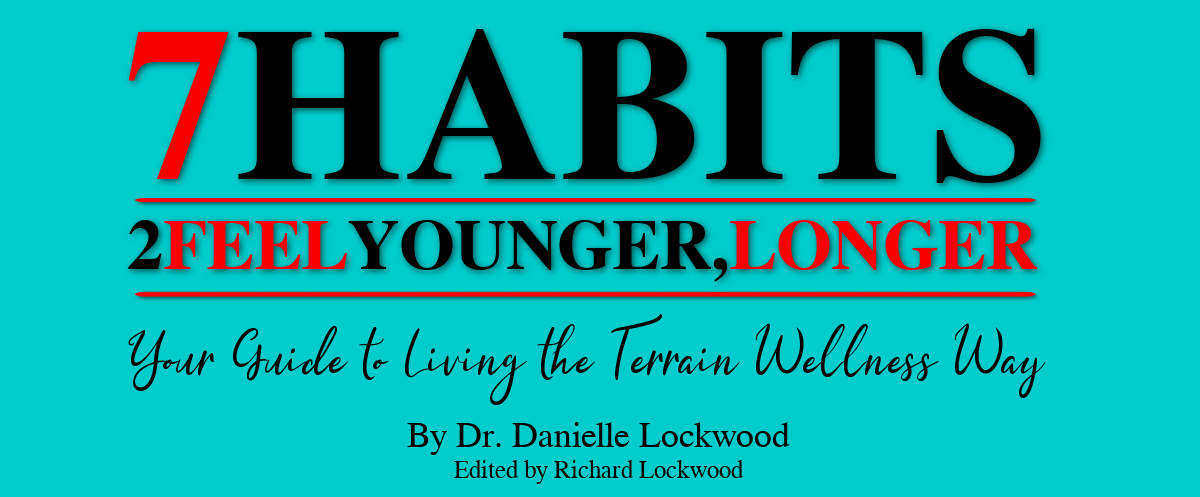
-
Contents:
- Drink Enough Water
- Eat Real Food
- Get More Sleep
- Meditate Daily
- Move Every Day
- Clear Emotional Triggers Daily
- Create Emotionally Healthy Relationships
The following are a few of the simple, yet often overlooked, foundations for lifelong health and wellness. While many of these fundamentals are simple, it’s also true that each one of these habits has the power to transform your life. Taken together, practicing all seven of these simple habits can exponentially improve your quality of life.
Our company name, Terrain Wellness, is more than a brand, it is a powerful metaphor. Terrain Wellness is a bold statement that we can experience greater health and life-fulfillment by mapping out the metaphorical landscape that defines each person. While everyone’s terrain is distinct, there are certain principles that apply universally. While the ways you apply them can be as unique as you like, this list of seven habits is an attempt to provide most readers with a few constructive ways to help you feel younger, longer.
Of course, talk with your doctor and a competent mental health professional first. This booklet is not medical advice, and certain diseases or states of mental health might mean that some or all of this list isn’t right for you. The information presented is opinion that is presented for entertainment purposes only.
- 1. Drink Enough Water
-

Yes, we’ve all been told to drink enough water our whole lives. Despite this, most people are frequently or habitually dehydrated. A constant supply of fresh water is necessary for sustaining human life. Water is instrumental in the body’s circulation, metabolic and detoxification processes. Being dehydrated causes harmful toxins to build up in the body. Over time, these toxins lead to a number of preventable health conditions that are tied to premature aging.Talk with your doctor about water because certain medications and health conditions, especially those related to the kidneys, may alter the correct amount of water that’s right for you.
- The majority of Americans walk around chronically dehydrated.
- Chronic dehydration makes anyone look older and feel tired.
- Without adequate amounts of water, you’ll experience health problems like chronic constipation, increased allergic symptoms, impaired mood and cognitive function, increase in frequency/severity of headaches and increase in cravings for sugar and food.
- Keeping hydrated helps curb cravings for sugary food and drinks. In turn, excessive empty calories cause organ damage and makes one susceptible to chronic diseases such as diabetes and heart disease.
- Dehydration causes dry, saggy skin. In time, dehydration also harms the body’s ability to repair damaged skin cells.
- Bear in mind: tea, bubbly water, coffee, soda & juice have ingredients that the body must use water to metabolize, so these beverages don’t count toward your water total for the day.
Some Points to Consider:
Most people can follow the goal of half your body weight in ounces of water per day. For example, if you weigh 200 pounds, your target for water consumption per day is 100 ounces. For every 8 ounces of caffeine,sugary snack, or 30 minutes of exercise, add another 8 ounces of water.
- 2. Eat Real Food
-
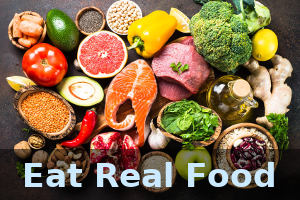
Consider that if you cannot identify an ingredient on a nutrition label as an actual food item, it’s probably not food. Talk with your doctor before implementing dietary changes. Nobody has ever had a deficiency of sugar, alcohol, fast-food, snack-food or soda. Processed foods are more about convenience, entertainment and above all, corporate profits. The problem is that processed foods have become so normalized that many people are unaware of the health consequences of habitually consuming them.
Of course, most of us are intellectually aware that junk food is bad. However, many people have eaten an unhealthy diet for so long that the health consequences of junk food are so normalized that they go unnoticed. The truth is that choosing nourishing, whole foods and eliminating processed junk food may be the biggest single thing someone can do to improve their health over time.
- Vegetables (limit starchy vegetables)
- Fresh Fruits (without added sugar)
- Nuts and Seeds
- Healthy Fats (olive oil, coconut oil, avocado oil, grass fed butter)
- Quality Meats (non-preserved, non-processed, naturally raised)
- Herbs and Spices
- Unprocessed Grains and Legumes (in small amounts)
What Is Real Food?
Yep, that’s it. We do not need anything else. If there is something else in your house that does not fit into these categories, open the trash and throw other non-qualifying “food” items in there.
Beware of “diet foods” that mislead people with sugar substitutes, organic ingredients or disguised sugars that aren’t really healthy. Organic junk food is still junk food. Misleading names like “organic cane syrup” are just fancy names for sugar. Artificial sweeteners still cause unhealthy insulin reactions in the body- avoid them. Although it’s marketed as being healthy because of the probiotics, sweetened yogurt’s Glycemic Index is similar to cake and ice cream. Many products packaged as diet foods are useless shortcuts that disguise junk food.
Eating the Standard American Diet that is high in processed foods is tied to numerous causes of preventable, premature death. To put it bluntly, processed foods and aging gracefully don’t mix. Over time, eating junk food leaves you feeling like a ball of puffy, inflamed, stagnant, moody, tired mess. Self-improvement, longevity and truly enjoying life requires energy; energy that the Standard American Diet just doesn’t provide. Want to look ten years older than you really are at your high-school reunion? Keep eating processed food. It’s not a pretty look, so choose real food instead.
- 3. Get More Sleep
-
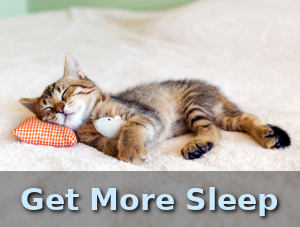
Sleep is life. Every human needs sleep. You need deep and restful sleep that lets you feel awake and refreshed throughout the day. Everyone knows they need a good night’s sleep to look and feel their best. So logically, it makes sense that compounding good sleep habits for many can have a tremendous cumulative effect on our health. Unfortunately, the reciprocal is also true. Lack of quality sleep is tied to heart disease, obesity and diabetes. In time, these serious health conditions result in premature aging and death. As we age, we still need 7-8 hours. Contrary to what some believe, 7-8 hours is still the recommended amount for the average adult. For reference, kids need 10-12 hours while teens need about 9 hours. Let’s build healthier sleep habits.
- Insulin resistance- a state that leads to diabetes, weight gain, mood swings and out-of-control blood sugar.
- Irritable moods and depression.
- Body pain.
- Fatigue that increases the risk of falling and losing balance.
- Lack of organ and body repair at night.
- Cardiovascular disease and hypertension.
- Increase pain patterns.
- Reduced memory and impaired cognitive function.
Lack of Sleep Contributes To:
- Excess Screen Time: Computer, cell phone & TV should be off at least 1-2 hours before bed. Light (especially blue light) from screens suppresses melatonin production inhibiting your body from winding down for sleep.
- Late Night Eating: Midnight snacks, especially sugary and carby foods, cause sleep-disrupting blood-sugar spikes and crashes that may also increase the urge to urinate. Also, your body’s blood sugar tanking after spiking late at night contributes to bad dreams and waking up at the wrong time.
- Caffeine: Caffeine’s half-life is about 4-6 hours in the average human. This half-life means that 2 cups of coffee at lunch will be like having one cup at dinner, which may not be a good idea. Caffeine’s ubiquity in our culture is part of why so many Americans can’t sleep.
- Alcohol: Contrary to popular belief, alcohol doesn’t really help you sleep better. When you fall asleep after drinking, your body doesn’t get as much R.E.M. sleep, which means that even though you’re not awake, your body doesn’t get the rest and repair it needs. Also, when you fall asleep after drinking, it’s more likely that you wake up later in the night and experience interrupted sleep.
Avoid These Sleep-Disturbing Habits:
- Dim the lights and turn off all screens at least 2 hours before bed.
- Set your room temperature on the colder side.
- Exercise in the morning.
- Stretch, take a bath, deep breathe to prepare your body for rest.
- Relaxing light conversation.
- Keep a journal near your nightstand and dump all your thoughts in it before you sleep.
- Sleep in complete darkness.
- Try to go to bed and wake up at the same time every day.
Instead, Practice These Healthy Sleep Habits:
Look in the mirror when you’re tired and compare that to how you look when you’re well-rested. The effects of a good night’s sleep are both self-evident and proven through scientific research. Improve your sleep habits and reap the numerous health benefits for years to come.
- 4. Meditate Daily
-

Breathe in, Breathe out. Sounds too easy, right? We’ve all heard about the benefits of meditation, but knowing is not the same as doing. Much like physical exercise, meditation produces best results when practiced regularly. Experienced readers will note that some aspects of meditation are closely related to emotional triggers, which we address in another section. While there’s many benefits of meditation, perhaps the most profound is how meditation helps you take control of your own emotional experience.Biologically, the measured breathing of meditation produces physical, hormonal and brain-wave changes in the body. Meditation takes you out of a high-stress state and into a restful, contemplative state. In real life-and-death situations, our fight-or-flight reaction is there to save our lives. But, having a fight-or-flight reaction at the wrong time can be a complete disaster. Just ask anyone who has ever regretted an argument. Over time, meditation helps you control your fight-or-flight reaction, so it’s only there when you want it to be.
On the emotional and cognitive levels, meditation helps us let go of disorganized thoughts and anxiety. Think of it like blocking useless pop-up ads on your computer. Left unchecked, the thoughts that “pop-up” in the mind build up in the background, each producing a small jolt of stress. Too many of these thoughts running in the back of your mind will escalate daily stress to harmful levels. Meditation reduces the intensity and duration of these unwanted thoughts; think of it like a pop-up blocker for your mind. With less clutter in the mind, you’ll have more brainpower free to help make important decisions in life.
- Improved concentration and focus
- Reduced anxiety and stress
- More control over emotional experience
- Positive physical brain changes in fear and emotional centers
- Reduced blood pressure
- Improved sleep
- Less reactive to outside events, people
- Improved ability to think clearly and problem-solve
Benefits of Meditation:
- It takes a few minutes every day.
- You actually have to do it.
- Letting go of nagging thoughts and focusing on the breath takes practice.
- Posting about meditation on social media is not the same as actually doing it.
Drawbacks of Meditation:
Meditation & Self-Awareness
Perhaps the most profound benefit of meditation is that it helps us control our emotional states. Yes, it’s common to hear people say things like “_____ makes me feel____.” In reality though, nobody can make us feel any emotion. This might sound strange at first, but please consider it with me for a moment.
The common perception is that our partner (or lack of a partner), kids, parents, boss, the president, the universe or even rush-hour traffic made us feel some way. The reason we think that “_____ makes me feel____” is because when we have a fight-or-flight reaction, our basic instincts take over and we end up on autopilot. The problem with going into autopilot at the wrong time is that in doing so, we give outside people and events control over us. By practicing the self-awareness of meditation, we take control of how events and people affect us.
Meditation allows us to control parts of our brains that are normally controlled unconsciously. While it’s true that we can’t directly control our heart rate, metabolism and anxiety-levels, we’re never truly helpless. Meditation gives us access to our own unconscious biological processes while also giving us greater control over how each of our brains experiences thoughts and feelings. Meditation is the discipline of taking control of our biology as well as our thoughts and feelings through focused breathing and mental exercise. So, what does this mean for our lives? Over time, meditation puts our brains in a more relaxed state where people and events can no longer negatively affect us.
Don’t worry, even if we meditate every day, we’ll still have fight-or-flight available when it’s really needed. Fight-or-flight is great when we’re running from a bear. However, fight-or-flight in normal life can lead to broken relationships, lost opportunities and even jail-time. Meditation is more than a lifehack for living longer, it’s a powerful tool that gives us control over when and how the fight-or-flight response shows up in our lives.
- 5. Move Every Day
-
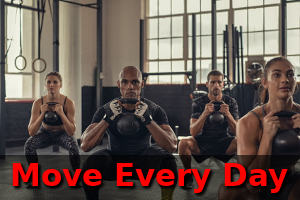
I almost never feel like exercising, but I am stronger than my feelings. So are you. Exercise teaches us that we are all stronger than our feelings, which is very empowering. I want you all to be empowered while taking a stand for your health and quality of life.Much like meditation, only more so, we’ve all heard of the many benefits of exercise. But knowing that exercise is good isn’t enough; knowledge is only power when we take action. The problem is that our lifestyle habits are self-reinforcing. If we lead an active lifestyle, then exercise, movement and staying active feel good. On the other hand, when we let things begin to slide, then exercise and physical activity seem much less appealing. Not everyone wants to be an athlete, and hitting the gym, treadmill or running isn’t everyone’s idea of a good time. However, incorporating physical activity into our daily lives is crucial to having a long and healthy life.
- Increased Mental Performance & Focus
- Increased Self-Discipline & Self-Respect
- Improved Mood & Emotional Health
- Reduced Anxiety/Depression
- Greater Life Satisfaction
- Longer Life Expectancy
- Weight loss
- Greater Resistance to Preventable Illnesses
- Improved Digestion
- Improved Sleep
- Lowered Blood Pressure
- Muscle Strength & Conditioning
Benefits of Exercise:
There are plenty of ways to incorporate movement into our lives. Even going for a walk or doing some light activity that you gets up out of a chair is worthwhile and will improve your health. There are simple exercises that you can do without equipment in your office or home. Need a little motivation to keep you on track? There are plenty of very affordable online fitness and yoga programs that you can follow along with using your smartphone or laptop. These online resources are great for anyone with a busy work schedule and/or small children at home.
I know, it’s easy to feel tired and unmotivated after a long day of work, family and adult responsibilities. But, if everyone simply reallocated 15 minutes of NetFlix/Facebook/Instagram/YouTube time to getting some light to moderate exercise in every day, we could transform our entire nation’s health and quality of life. Committing to movement is a way for you to empower yourself. Wishing, hoping or making social media posts won’t give you self-empowerment, you have to take your personal power by force. Take back your body, take back your life.
Movement is about taking a stand and loving yourself, even if it gets uncomfortable. This mindset of perseverance will also help you in your work, relationships and life goals. Make a plan with clear goals and real steps to achieve them. Make an emergency plan to help you get back on track. Find a friend to help you stay accountable to your goals. You don’t have to go to extremes, even light/moderate activity will benefit you. It starts with you, today.
By far the most important thing that exercise does is improvement of mood. When you feel better, it improves all aspects of your life. Exercise is crucial for building physical and mental resilience. Sticking to a fitness plan builds confidence and self-respect. Exercising even when you don’t feel like it is you taking a stand for yourself: fighting for yourself is loving yourself. If you won’t fight for yourself and love yourself, how can you truly love those around you? Exercise forces you to push yourself in a safe and consistent way. In an age of convenience and ease, exercise is proof that we can do hard things. Exercise builds confidence and capability.
- 6. Clear Emotional Triggers Daily
-
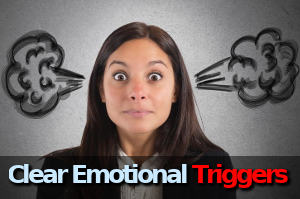
An emotional trigger is any topic that you feel uncomfortable dealing with. Who or what makes you angry, sad or disempowered? Of course, there is no intrinsic power inside these various triggers that can truly make us feel anything. Nonetheless, there is something inside each of us that is somehow vulnerable to certain unique conceptual slings and arrows. What may be less obvious, is that these triggering events have at some point gained our tacit approval in order to have any effect on us. This sounds strange, but please stay with me.
While everyone has triggers, these emotional buttons don’t have to be permanent or compulsory. For example, many people have had an experience where someone tried to trigger us and it just fell flat. Perhaps it was a cutting remark or attempted manipulation that just didn’t get through. Maybe you’ve noticed a time in your life where something that used to trigger you just doesn’t have the same power anymore. These moments of clarity, where we can see a past emotional trigger that is now gone or greatly reduced, are signs of increased self-awareness.
What I’m trying to say is that people can only push our buttons insofar as we have those buttons installed. This is a difficult truth to face, and one that requires having mercy on yourself. But through conscious effort, we can face the shame and fear underneath those emotional triggers and disarm them. Many of these emotional triggers, or “buttons,” are the product of our upbringing or past trauma. However we came about having these buttons, whether they were inherited or are the remnants of past trauma, as humans we have the opportunity to empower ourselves by removing our triggers. While we can’t undo the past, we can reduce and eventually remove these emotional triggers so that they no longer have power over us.
Rather than hot buttons to be avoided at all costs, our emotional triggers can also be clues that guide us to dig deeper into how we really feel about something. Emotional triggers may indicate a loss of love, self-expression or personal power. Underneath that fear and anger, perhaps there is vulnerability and a deep need for a human connection or expression. Our emotional triggers can be valuable breadcrumbs that can help us navigate toward increasing our self-awareness and humanity.
- What people/subjects/events/things/concepts evoke an especially strong negative reaction from you?
- What topics/events/people “make you feel” sad, angry, shameful or powerless?
- Where do you judge yourself or compare yourself to others?
- What topic, people or subjects of conversation evoke a physical response in your body such as tightness in your chest, flushing or anxiety?
Questions for Identifying Emotional Triggers:
Use these questions to help you begin to identify your emotional triggers. Simply becoming aware of your emotional triggers is a step in the right direction. Ask yourself how this trigger came about, and what healthy communication needs to take place in order to resolve it. The more you become aware of and take ownership of your own triggers, the more you empower yourself, create healthy communication and mature boundaries in your life.
In my better moments, I might say to myself: “This person is speaking or acting in a certain way, but I choose to take ownership of how their way of being or acting affects me.”
Of course, all of this is much easier said than done. Someone once quipped: “Everyone feels enlightened until they spend the holidays with their family.” The work of maturity and personal growth is never completed. As such, let us all approach this work of taking ownership of our emotional triggers with mercy for ourselves and others.
- 7. Create Emotionally Healthy Relationships
-
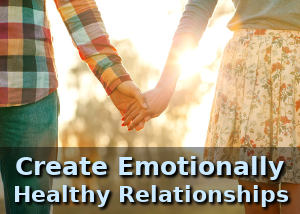
The following is not medical or mental health advice. If you think you have a psychiatric or psychological issue, speak with your doctor or a qualified mental health professional.
In reading up to this point, you might have noticed that each of the previous life skills/disciplines relates or build upon previous ones. Relationships are last on this list for good reasons. Everything from our physical health all the way up to our cognitive and emotional health is put to the test in our relationships. We won’t truly be able to show up as our best self in platonic or romantic relationships unless we have the previous six factors under control. If even one of the above disciplines slips, one of the first aspects of life to suffer is the quality of our relationships.Humans are primates, this means we thrive in social communities. Leading a fulfilling life is dependent on our having emotionally balanced relationships. Of course, healthy relationships require that we take some (but not excessive) risks of being hurt while also navigating and making peace with our own emotional triggers while finding others who are willing to share that risk, vulnerability and connection with us. It’s very important to make sure that this vulnerability and risk is shared because there are unhealthy patterns where some people take on all of the emotional effort, while others won’t invest much, if any, of the emotional energy/risk.
Learn Romantic Attachment Styles!
After a decade of pleading with my (now-ex) husband for actual commitment to our marriage, I found myself at home alone with a baby, while he habitually pursued affairs and late nights at the bar. As my ten year relationship went down in flames and my well-being was smashed by the most excruciating emotional pain I’ve ever felt in my life, I swore that I would face any pain to find out how and why this happened to me so it would not happen again.
My search for answers led me to a therapist, who introduced me to the concept of Romantic Attachment Styles. Attachment styles are the unconscious relationship patterns that were established very early in life. These attachment styles dictate how our brain attaches to potential mates and even friendships. Those with unstable, traumatic, emotionally-distant, absent, controlling, smothering or otherwise imbalanced parents often bring the emotional scars of their past into their adult relationships.
Perhaps you find yourself over-invested in relationships, while the other person seems “not that into you,” sends mixed messages or is “confused,” you may be in what experts call an “Anxious” attachment style. On the other hand, if you find yourself “unable to commit,” “can’t find the right person” or people you date usually seem too “needy,” then you might be in an “Avoidant” pattern. “Secure” attachment is where a person is secure in their self-worth, can connect with and commit to others deeply while also maintaining healthy emotional boundaries.
Based on your attachment type (Anxious, Avoidant or Secure), researchers can predict repeating relationship patterns that can persist for decades unless they are faced. Too often, Anxious or Avoidant relationship patterns find themselves locked in a repeating loop of painful breakups and unfulfilling relationships. If this is you, there is hope! With practice, you can learn about and break out of these harmful relationship patterns. Read the book Attached (by Dr. Amir Levine & Rachel Heller) and put it into practice immediately.
- Relationships take work on both sides. This means each person gives 100% to the commitment of honesty and transparency.
- Learn both yours and your partner’s attachment style (Anxious, Avoidant or Secure).
- Learn to reduce the harm you cause when you’re emotionally triggered. This is crucial to building deeper, healthier connection.
- Practice continual emotional development. Think of personal growth like important “software” updates that keep your emotional health and relationship on track.
- You will become irritated and frustrated at times. Learn about and practice non-violent communication with your partner so you can resolve conflict safely.
- Cultivate your emotional intelligence. Relationships bring out your “ugliness” and will require you to face your own shame and vulnerabilities. You must face and communicate your emotional triggers with your partner.
- Apologize for your mistakes early and often; try to see where your partner is coming from. Empathize, communicate and make amends quickly.
- Pause to take deep slow breaths during intense discussions. Don’t make things worse by lashing out. Keep the perspective that “we will be better on the other side of this.”
- Hope is not a strategy. Schedule family time, alone time and quality time with just the two of you. Overcommitting to family, your kids, work or social obligations can kill your marriage/relationship. Good relationships take planning and strategy.
A few Ideas for Emotional Healthy Relationships
Most important to the dynamics of creating a spiritually connected relationship is emotional intelligence. Emotional intelligence is a mix of holding yourself and others accountable for what is good enough for your life. To do this, you’ll need all of the areas of your life to be in top form. Meditation, deep breathing and getting your physical health handled properly are highly recommended.
- What went wrong with your past relationships? Have you evolved in how you act in relationships and how you choose a partner?
- Do you “pick the wrong partners”? Go read Attached (by Dr. Amir Levine & Rachel Heller) and put it into practice immediately.
- Are you willing to fight for a great relationship? Everything good in life comes through facing uncomfortable challenges. Either get in the fight or be honest with yourself and others that you just don’t want to put in the work.
- Are you mutually investing the same amount into the relationship as the other person? If you over-invest or if you have trouble committing, you need to learn more about Attachment Style.
- Are you realistic with who you are and what you need?
- Are you willing to take ownership of how things went wrong and could have gone better both in past and current relationships?
- Are you committed to harm reduction when arguments occur?
- When disagreements happen, how quickly are you willing to repair and forgive?
- Do my partner’s actions align with their words? Hint: their actions are the best measure of who they are.
- Do you know how to manage your physical and emotional state? How do you and your partner practice self-care? Have you eaten, showered, exercised, meditated, faced emotional triggers and owned your anxiety?
Questions to Ask Around Emotional Intelligence:
Relationships are complex and constantly evolving. There’s no way that a single book, much less a brief booklet, could say everything about the subject. Nonetheless, the above represent decades of my own painful learning and personal growth. This booklet is not a substitute for therapy. The advice given reflects my own personal experiences and may or may not be useful or constructive for you. If you think you have a psychiatric or psychological issue, speak with your doctor or a qualified mental health professional.
Conclusions:
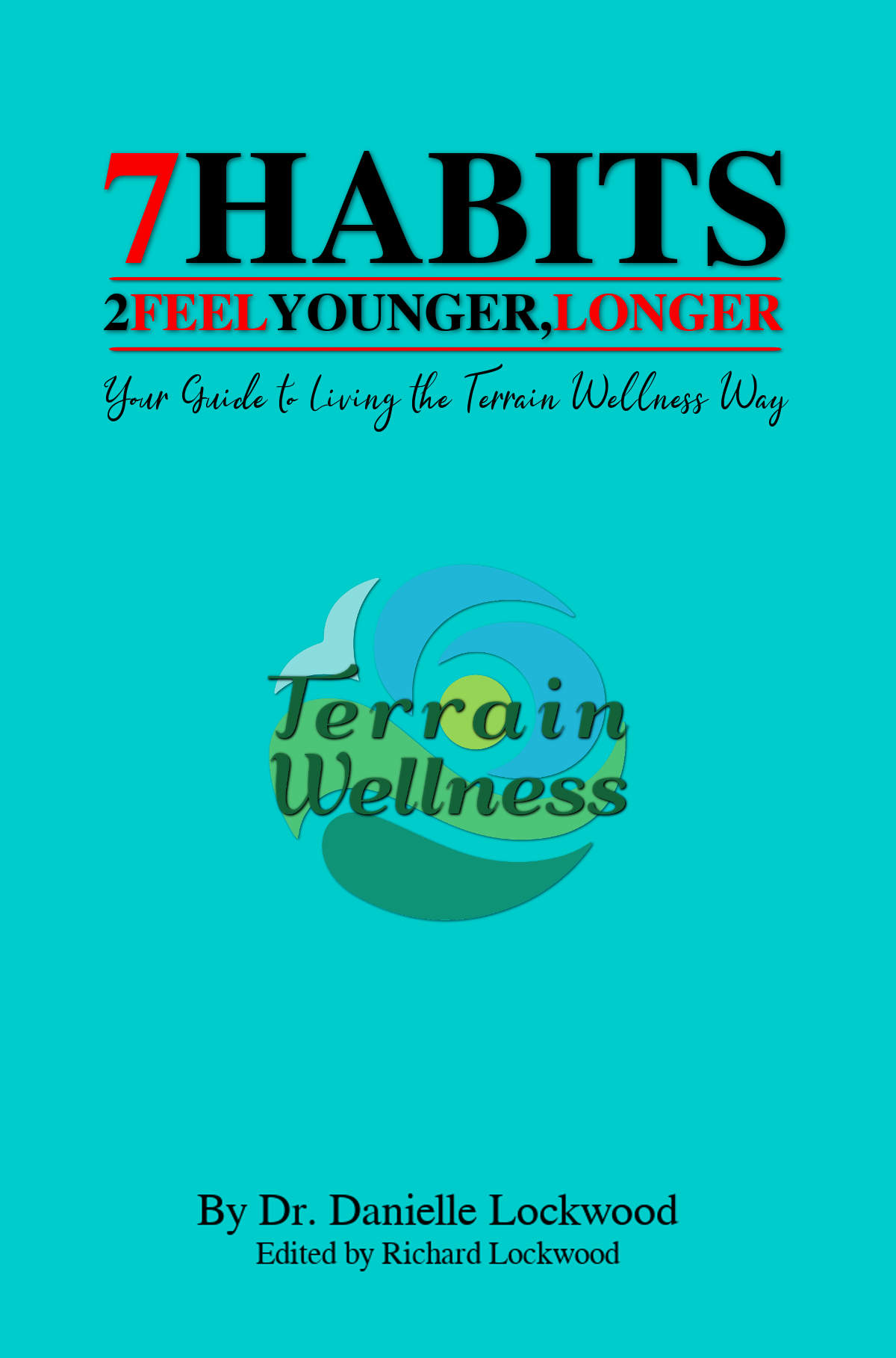
While we began with very simple life practices like drinking enough water, some of the later skills may take a lifetime to master completely. This was by design because each practice builds on those that come before. No matter how simple or complex, I believe that practicing and continually improving in each of these areas is crucial to leading a happy and fulfilling life. While the link between emotional health and physical well-being is indirect, it is still nonetheless very real. Emotional states like chronic stress or heartache produce very real physical consequences in our lives.
While much of life fulfillment is subjective, I still believe that the practices we’ve gone over today will be helpful to most people. As stated earlier, this booklet is not medical or psychological advice and is not intended to treat or cure any condition. Please speak with your doctor or competent mental health professional.
Resources:
Institute of Medicine (US) Committee on Sleep Medicine and Research; Colten HR, Altevogt BM, editors. Sleep Disorders and Sleep Deprivation: An Unmet Public Health Problem. Washington (DC): National Academies Press (US); 2006. 3, Extent and Health Consequences of Chronic Sleep Loss and Sleep Disorders. Available from: https://www.ncbi.nlm.nih.gov/books/NBK19961/
Goyal M, Singh S, Sibinga EMS, et al. Meditation Programs for Psychological Stress and Well-being: A Systematic Review and Meta-analysis. JAMA Intern Med. 2014;174(3):357–368. doi:10.1001/jamainternmed.2013.13018
https://www.nccih.nih.gov/health/tips/things-to-know-about-meditation-for-health
https://www.psychologytoday.com/us/blog/the-gen-y-psy/201810/how-spot-your-emotional-triggers
https://www.nih.gov/health-information/emotional-wellness-toolkit
